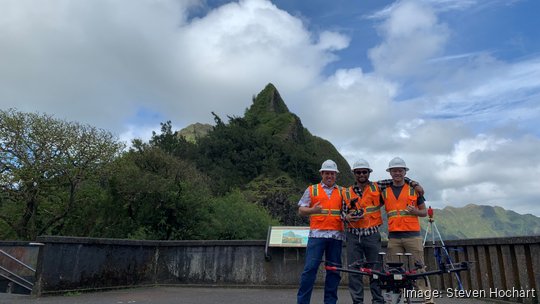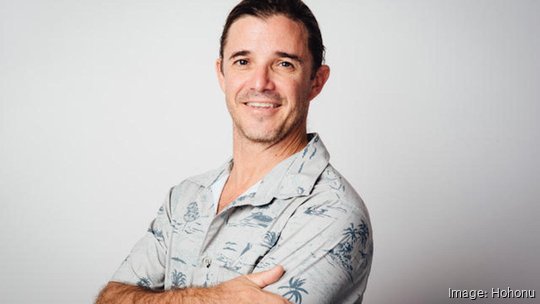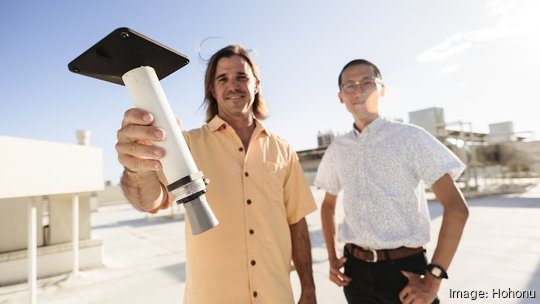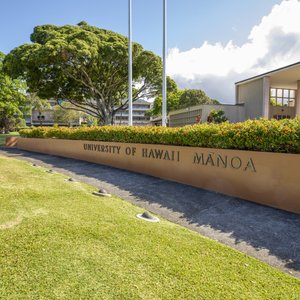Now in its second year, Pacific Inno’s Fire Awards recognize excellence in tech and innovation — including areas like food and energy independence. This includes both startups and longstanding businesses that are innovating in new ways.
The winners were chosen from a mix of nominations from the community and the PBN editorial team. This year, the awards recognize 16 businesses across four categories: energy; food and agriculture; technology, science and data; and workplace. Each category also includes one company that’s designated as the “Blazer” — the top honoree as determined by the PBN editorial team based on information provided in the nomination, growth potential and recent accomplishments.
PBN asked each of the honorees about recent funding success, as well as what they are the most excited about in their business right now. Plus, honorees also share their insights on how Hawaii can create a more robust tech sector.
Below are the honorees in the technology, science and data category. Click here for the energy category, here for food and agriculture, and here for workplace.
"BLAZER"
Dudek
Steven Hochart, director of Mapping and Surveying Division

An environmental, planning, and engineering firm headquartered in California, Dudek has a local office in Kailua that opened seven years ago. The office provides mapping and survey solutions for projects across the country, and its local work has included assessing damage for a landslide on Pali Highway and flooding in Hanalei in order to help create repair plans. Dudek is also involved in solar development and has used unmanned aerial vehicles and Artificial Intelligence technology to cost-effectively survey more than 30,000 acres of land that will eventually host renewable energy projects in support of the state’s renewable energy goals.
Tell us about your most recent funding success. As a private company focused on professional services, we operate our business without outside funding. We have been able to successfully invest into our business organically.
What about your business excites you the most right now? The most exciting aspect of our business is constantly looking at the “traditional way of doing business” for services such as land surveying and innovating new ways to deliver the same services with new technology innovations that enable us to deliver services to our customers faster and for a lower cost.
What is one thing you think we need as a state to cultivate a robust tech and innovation sector? As a state we could do more to collaborate amongst members in the technology business sector. With remote work a part of every day companies now, Hawaii has fewer barriers to providing technology innovation here in Hawaii and around the world.

Hohonu, Inc
Brian Glazer, co-founder and CEO

A Hawaii-based climate tech startup, Hohonu aims to protect communities from future flooding by monitoring water level in coastal areas. Its real-time technology has been deployed in more than 100 locations across the country, and it has captured over one million hours of water level data across 13 coastal states. Glazer is an associate professor of oceanography at the University of Hawaii at Manoa.
Tell us about your most recent funding success. Hohonu recently raised $1.8 million from top climate-tech investors located here in Hawaii and on the Mainland. Hawaii investors included Elemental Excelerator and Blue Startups. Other investors included Builder’s Vision, TELUS Pollinator Fund for Good, and Sustainable Ocean Alliance.
The funding is helping us expand our technology to more regions, as well as grow our team here in Hawaii.
What about your business excites you the most right now? We live by the motto, “Think globally, act locally.” We have an opportunity to put those words into action by offering our technology around the world while also directly working on addressing climate change challenges here in Hawaii. And, being a catalyst for the local startup ecosystem by building a world-class team that is headquartered in Hawaii.
What is one thing you think we need as a state to cultivate a robust tech and innovation sector? More educational resources for our keiki to think bigger with technology, while being true to ourselves and not mimicking Silicon Valley. Our partner, Purple Maia, is doing amazing things for that.

SIP Systems Hawaii, Inc.
Brian Enomoto, vice president
SIP Systems Hawaii is an Oahu-based wholesaler and service provider for Structural Insulated Panels, or SIPs, used for residential, community, or commercial building projects in the Islands and beyond. The company has approximately 12 projects in the pipeline.
“We are proud to be a Hawaiian-, veteran-owned small business that’s pioneering a new building material that is stronger, faster, and greener.
“We use small diameter trees that are quickly reforested and expanded polystyrene foam that’s steam expanded and 100% recyclable. We are a pre-engineered system that has withstood hurricanes and earthquakes. SIPs are up to 60% more energy efficient and have 45% smaller carbon footprint compared to traditional building.
“Our vision is to have SIPs manufactured in Hawaii creating great paying jobs and providing a solution to help solve our housing crisis. Our state has been very supportive of SIPs because we are an approved International Code Council/International Building Code/ International Residential Code building material. We are helping ease construction costs while making buildings and houses more structurally sound and energy efficient. We are interested in utilizing enterprise zones to help reduce the startup costs for manufacturing locally and would love to have federal support from the Infrastructure Act.”
Oceanit Laboratories, Inc.
Matthew Sullivan, director of product

Oceanit describes itself as a “mind to market” company that takes innovative ideas and turns them into user-centric solutions. Oceanit works across areas including aerospace, health care, energy, the environment, consumer technologies and more. One of the company’s most recent inventions is the Blast Ninja, a noise-reducing nozzle for abrasive blasting that is designed to protect operators and those nearby from the effects of high noise exposure levels. Oceanit said the business grew from $0 to six-figure sales within six months, and surpassed the quarter-million dollar mark at the end of last year. At the beginning of 2023, the Blast Ninja brand was acquired by Kennametal Inc., a supplier of tooling and industrial materials.
Tell us about your most recent funding success. At Oceanit, I lead the team that transforms the amazing science we develop into products and services that impact the world.
Over the past year we developed a rapid test for Covid called ASSURE-100 that received two [U.S. Food and Drug Administration] authorizations for professional and at-home use. The test leverages a new type of artificial intelligence developed at Oceanit to design custom RNA molecules and is the first product to market that uses this platform technology.
We also developed a new industrial product called Blast Ninja that improves workplace safety for industrial workers. The product was acquired by Kennametal.
What about your business excites you the most right now? Climate change and decarbonization technologies are two areas that excite me the most right now. Oceanit is actively developing new technologies for green hydrogen production, carbon capture, and industrial scale decarbonization that have the potential to significantly impact global [greenhouse gas] emissions.
HeatX is one of these products – it enables power plants to rapidly cut their GHG emissions while the world transitions to 100% green energy. We’ve deployed the technology not only in Hawaii but globally in the Continental U.S., Europe, the Middle East and Asia.
What is one thing you think we need as a state to cultivate a robust tech and innovation sector? When locals hear about Oceanit, they often consider us a unique outlier compared with what can be done here in Hawaii. What they miss is that the world is rapidly changing and the new “knowledge” economy is based on imagination, education and determination. In the past, being in Hawaii came with significant geographic limitations to doing business. That is no longer the case for many industries. Hawaii as a state could do much more to educate, encourage, and support our keiki and young professionals to have careers in technology and innovation.




